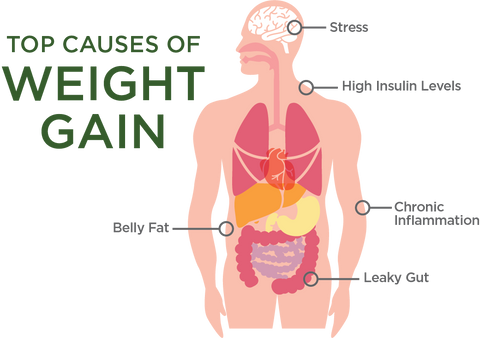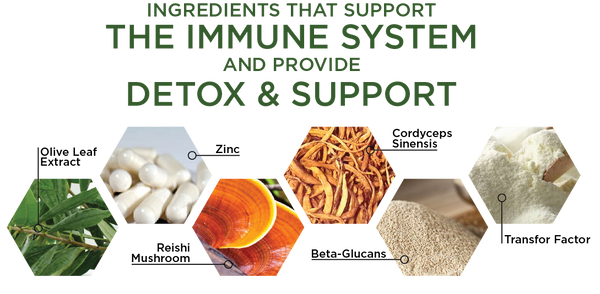Organ, Blood Vessel, Joint, & Gut Inflammation: The Hidden Threat
Inflammation is a subject that is increasingly mentioned in medical and health journals – and for good reason. The more researchers learn about it, the more they have come to realize it is the source of a significant amount of the health concerns our society is facing today.
Minor issues like a lack of energy, inability to concentrate, weight gain, aches and pains, headaches, bloating, and acne breakouts to more serious issues like Type II Diabetes, auto-immune disorders, fibromyalgia, heart disease, depression, arthritis, and severe anxiety may be linked to long term, chronic inflammation. (Read supporting studies 1, 2, 3, 4, 5)
Even if you feel healthy and aren’t experiencing any problems yet, chances are, inflammation is slowly taking a toll on your tissues, joints, and organs until it eventually rears its ugly head. When it comes to your health, its best to fight inflammation while the problems are indiscernible or minor – waiting until major health problems occur will make it harder to treat and the damage much harder to repair.

What is inflammation?
Inflammation, specifically acute inflammation, occurs as a response to injury or infection and is necessary to help us heal. During a normal, healthy inflammatory response, the body floods the wounded area with immune cells and nutrients that destroy bacteria and repair damaged tissues. Once the initial trauma is over, the inflammatory cells and molecules are supposed to retreat so the healing process can begin.
Chronic inflammation, however, happens when the original “emergency alarm” fails to shut off when it should. This could be a result of an injury that fails to heal, an immune system that is overstressed, or continuous exposure to elements that trigger the “alarm response” (stress, toxins, viruses, harmful bacteria, or a malfunctioning or “leaky” gut). When this happens, it acts like a slow-burning fire, continuing to trigger pro-inflammatory immune cells that attack healthy tissue - damaging blood vessel linings (in heart disease), pancreatic tissue (in diabetes), joint tissue (in arthritis) and others. (Study here)
How to Fight Chronic Inflammation
The solution and its effectiveness depends on the severity of the damage. Any step you can take to reduce inflammation is a good one. But, if you are experiencing visible or ongoing health problems – chances are, you won’t see truly positive results unless deliberate steps are taken to get ahead of the problem.
Supplementation
I’m going to list this first for a couple of reasons. If you have severe inflammation, you will probably need to do this in addition to diet and lifestyle changes to achieve faster, visible results.
If you don’t have any health issues, then experience has taught us that most people do not have the motivation to undertake or stick to strict diets and regimes long term. A supplement will help to pick up the slack on days or weeks where you cheat on your diet or slack on your gym routine.
Supplement Recommendations:
Anti-inflammatory supplements contain natural anti-inflammatory benefits. These are different than Non-Steroidal Anti-inflammatory Drugs (NSAIDs) such as aspirin, ibuprofen, and Naproxen. In fact, those drugs should be avoided unless absolutely necessary because of the detrimental effect they have on the gut lining.
- Fish Oil – High in Omega-3 fatty acids, which are beneficial for brain health as well as anti-inflammatory. Around 3 grams a day is recommended.
- Antioxidants – Reducing oxidative damage can help control inflammation
- Curcumin – a powerful anti-inflammatory found in turmeric
- Quercetin – an antioxidant with anti-inflammatory properties, quercetin also can help protect against damage cause by excessive stress levels
- Resveratrol - A study performed at Harvard University tested the effects of resveratrol on middle-aged mice with high-calorie diets. While the mice did gain weight, the resveratrol group lived about 30% longer, had enhanced Insulin sensitivity, fewer fatty deposits in the arteries and liver, lower levels of inflammation, and better balance and coordination.
- Alpha Lipoic Acid – A coenzyme that is both an antioxidant and anti-inflammatory, alpha lipoic acid is unique in the fact that it is both lipid soluble and water soluble – essential for protecting different areas of the cell.
- Zinc – Popular for its immune supporting benefits, it has also been found to be effective for reducing inflammation
Helpful Hint: It is also important to mix it up or take smaller doses of multiple supplements since overconsumption of a single ingredient may cause issues
 Healthy Gut Support
Healthy Gut Support
One of the single largest sources of chronic inflammation is a compromised gut. The gut also plays a huge role in our overall well being – having a direct impact on immune function as well as mental health. In an unhealthy gut, there are usually numerous factors at play – a lack of beneficial bacteria, an overgrowth of harmful bacteria and yeasts (such as Candida Albicans), and a weakened gut lining. (Supporting study here)
Contributors to poor gut health include:
- A diet with too much sugar, and not enough fiber, enzymes, or probiotics
- Stress
- Use of non-steroidal anti-inflammatory drugs (NSAIDs) such as aspirin, ibroprofen, and naproxen,
- Antibiotics use
- Consumption of preservatives, artificial dyes, pesticides, chlorinated water, and other chemicals (all are toxic to friendly gut bacteria)
Suggestions for Supporting a Healthy Gut
- Cut down or eliminate soda and/or Coffee
- Reduce or eliminate dairy (with the exception of milk-based kefir. The microbes in kefir consume the lactose in the milk, which is causes problems for most people)
- Reduce or eliminate grains – even whole grains since they can be irritants that cause inflammation in most people. Too many carbs is also a large source of inflammation so cutting out grains will reduce carb intake as well.
- Eat at least one to two leafy green salads a day
- Add at least one fermented superfood such as kefir, cultured veggies like sauerkraut or kimchi, or kombucha. More than one is even better.
- Supplement with Green Tea to help kill Candida overgrowth which can cut down sugar cravings and allow the gut lining to heal
- Supplement with Cissus Quadrangularis – this natural extract has been shown to be effective at restoring the gut lining

Tips to Help Reduce or Manage Stress Levels
Chronic stress (things like worrying, stressing about stress, overtraining, and not getting enough sleep) can change the gene activity of immune cells to be pro-inflammatory – even when there is no infection or trauma to fight. It can also wreak havoc on your gut – affecting gastric secretions, barrier function, mucosal blood flow as well as reducing the diversity of your gut flora. (Related studies 1, 2, 3)
Ways to reduce stress, or reduce the impact of stress:
- Meditation – When you meditate, you clear your head and reduce the information overload that contributes to stress
- Regular Exercise – Yoga, Tai Chi, Dancing Strength Training and Running are particularly effective for reducing stress levels.
- Get outside – studies show that spending time outdoors reduces the production of stress hormones and activates parts of the brain associated with empathy and love. You can also enjoy these benefits by bringing nature indoors – house plants also have a positive effect on mood and feelings of well being.
- Add Rhodiola Rosea to your nutritional supplements – a member of the adoptogen plant group, studies show that it can enhance our bodies tolerance to physical and environmental stress as well as reduce mental fatigue. (Study here)
 Lose the Excess Pounds
Lose the Excess Pounds
Fat cells secrete pro-inflammatory cytokines (study 1, 2) and histamines. The larger your fat cells – the more potential you have for increased inflammation. Fat cells also serve as storage for toxins such as pesticides, pollutants, preservatives, food additives and heavy metals when there is insufficient fiber n the diet (which absorbs bad fats that carry such toxins) or when the body is unable to eliminate them due to problems with the digestive system. Enlarged fat cells are able to carry more of these toxins where they will be secreted continuously into the bloodstream – causing issues such as inflammation, fatigue, headaches and other health issues.
Ways to help shed extra pounds
- Reduce Inflammation – When your body thinks it is under threat or injured (ie: experiencing inflammation), it goes into survival mode. This switches the metabolism from a burn setting to a store setting. If you have trouble losing weight even on a low calorie diet – this could be one major reason why. Your body will slow down various processes to conserve energy in order to store as much incoming calories as possible. (Link to leaky gut study)
- Diet – An obvious answer, but it’s important. The danger of a long-term low calorie diet is that the body will believe it is in a time of scarcity and will start to try and store energy rather than burn it. Focus on reducing sugar and carbs and replacing them with calories from good fats (avocado, walnuts, fish oil) and protein. Lots of fiber and leafy green vegetables is also a must (to help detox and support a healthy gut biome)
- Switch from your cardio routine to a High Intensity Interval Training (HIIT) routine – although good for the heart and for stress, old fashioned cardio does boost weight loss to a significant degree. HIIT routines not only burn significantly more calories during the workout, but studies show that the body continues to burn calories for an additional 24 hours.
- Supplement with Cissus Quadringularis and Irvingia Gabonesis (African Mango) – While there is no such thing as a magic bullet that will do the work for you, the combination of these ingredients has provided some pretty serious results during clinical studies. Subjects lost 187% more weight in comparison to the placebo group. For more information, click here
Support the Immune System
The Immune System is very busy and if it gets too stressed or overloaded, things can go horribly awry. Rather than helping to heal, it can actually start attacking healthy cells and tissues. Reducing inflammation will help reduce its workload, but it would be a good idea to add a few things to your program to help support healthy Immune function.
Top Immune Support Supplements
- Transfer Factors – Transfer factors are molecules that are filled with memory cells which contain information that tells our immune system the fastest way to defeat the viruses or bacteria we encounter on a day to day basis.
- Zinc – An essential nutrient that ensures proper functioning of the immune and digestive system
- Olive Leaf Extract – An antioxidant more powerful than green tea that exhibits antiviral and antifungal characteristics
- Yeast Betagucans – found in various mushrooms, cereal grains, and baker’s yeast, these help make the immune system smarter and more efficient – but not overactive, which can help prevent complications from those who suffer from an overactive immune system (ie: an auto immune disorder).
- Reishi Mushroom – Rich in polysaccharides which boost the health of the immune system
- Cordyseps Sinesis – Scientific studies have shown that cordyseps sinesis enhances Natural Killer (NK) cell Activity and improves oxygen utilization.
Where to Start?
As helpful as these suggestions might be, it might all seem a bit overwhelming. The best way to start is to take things slowly or combine things wherever possible.
For starters, the supplement recommendations can all be found in the 3 products within the Juniper Life Transformation Program, which was designed to target and reduce inflammation from all angles.
For exercise, adding yoga and nature walks to your regular weekly routine provides excellent stress-reducing benefits that are low impact and easy for everyone to perform.
For diet, start by just making sure that at least two meals a day follow the above advice and just don’t go overboard on the third meal. Don’t allow snacking as this can encourage leptin resistance and is where most diet cheating occurs.
As you get more consistent with these small changes, it makes it easier to add another healthy habit to your routine until you eventually find that most of your habits are very healthy. Its improbable and very likely impossible to make perfect choices all the time – but always making an effort to get back on track and do a little better each day will make a huge difference in your future health.

 Healthy Gut Support
Healthy Gut Support Lose the Excess Pounds
Lose the Excess Pounds